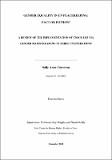| dc.description.abstract | The year 2020 marked the 20th anniversary of UN Security Council Resolution (UNSCR) 1325, on Women, Peace and Security (WPS). The resolution recognised the invaluable role women play in the prevention and resolution of conflict and in the establishment of sustained peace. This coincided with the 40th anniversary of the Convention on the Elimination of All Forms of Discrimination Against Women (CEDAW) and the 25th anniversary of the Beijing Program for Action. It also marked the ten-year countdown to achieve the UN’s Sustainable Development Goals, which include a commitment to end gender inequality by 2030.
In the 21 years since its passage, UNSCR 1325 has been tested often. The world continues to experience conflict, peace is often fragile, and the meaningful participation of women in peace and security remains elusive. This thesis addresses how UNSCR 1325 has functioned in practice, as a political and legal framework to advance women’s equality/empowerment in the peacekeeping context.
The central hypothesis examined is that the widespread implementation of UNSCR 1325 and the broader WPS agenda in peacekeeping operations, translates into increased gender equality in those operations, the broader UN context and by extension, the host countries in which missions are situated. Gender equality in this context is interpreted as qualitative and quantitative equality between genders with equal opportunity of participation as equally empowered partners. In short, the research interrogates how well gender has been mainstreamed conceptually, into the policy frameworks that inform activities and practically, into mission activities on the ground. The research hypothesis is investigated through a review of the implementation of UNSCR 1325 via gender mainstreaming in the three UN peacekeeping operations chosen as case studies for this project. A comparative case-oriented analysis is utilised to scrutinise whether or not, in what ways and under what conditions gender mainstreaming has succeeded as a strategy to advance gender equality and women’s empowerment in the operations examined. In this regard, it analyses the factors and conditions that have led to successful gender mainstreaming across the operational context, and those that have impeded this outcome operationally.
This thesis shows that despite increasingly positive rhetorical commitments to women’s equality in peacekeeping made by the UN with the passage of UNSCR 1325 and subsequent WPS Resolutions, that progress on the ground has remained minimal. Both quantitatively and qualitatively, women do not participate as equal partners in peacekeeping and continue to have less access to resources and decision-making power. This thesis interrogates that fact, exploring the current spaces available within law, policy and practice of the UN to pursue the human rights agenda of gender equality and equal empowerment. It then considers if UNSCR 1325 has enlarged those spaces. This research illustrates that institutional practice has been far outpaced by institutional rhetoric and the normative uptake of UNSCR 1325’s gender equality goals. This mirrors the fact that many ideas articulated in law can remain stronger in language than in implementation, at least initially, as norms tend to precede their execution, sometimes even by centuries. Thus, despite the clear de-jure framework currently in place, the operational environment continues to be discriminatory against women. This is largely due to the lack of accountability for the failure to implement policy and stated targets. Finally, this thesis not only addresses the efficiency (optimal achievement of operational objectives) and equity (human rights/non-discrimination based) arguments in relation to equality of participation between genders in peacekeeping, but also the comparative edge that women bring to peace-keeping, which the UN can no longer afford to be without. | en_IE |


